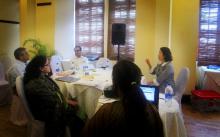
The Journal Manuscript Development for Global Health course encourages health professionals in the field to write and publish in peer-reviewed journals. In so doing, it supports a broader effort to compile and disseminate a wealth of programmatic knowledge and valuable experience that accrues every day in countries around the world.
This course offers learners advice on each step in the journal manuscript development process, from planning and preparation to submission of a final manuscript.
Objective
Upon completion of this course, learners will be able to do the following:
- Recognize the importance of capturing health knowledge locally and disseminating it globally
- Identify reasons to write and publish journal articles
- Recognize opportunities to publish
- Distinguish between the kinds of articles that global health journals typically publish
- Make the best match between experience, data, and information gathered and the kind of journal article best suited for sharing this knowledge
- Recognize essential elements that journal editors look for when considering a manuscript for publication
- Identify factors to consider when choosing a target journal
- Recognize the standard sections of research articles
- Identify field-tested approaches used to facilitate the writing process
- Identify criteria for authorship
- Recognize key components of journal guidelines to follow when preparing a manuscript for submission
- Recall ways to respond to peer review comments, revise manuscripts, and (if rejected) submit to another journal
Audience
The course will be relevant to global health professionals who have varying degrees of experience in journal writing and publication. Learners may include several groups:
- Novices who are interested in becoming first-time journal article contributors or authors
- Individuals who have contributed to journal articles and would now like to be an author
- Experienced co-authors who are interested in playing the role of lead author
- Experienced writers who have been lead author for one or more published article(s) and would now like to lead and coach a team of less experienced colleagues
Credits
The authors are grateful to the many individuals at Jhpiego headquarters, country offices, and elsewhere who reviewed course materials and provided valuable insights and suggestions. Thanks to internal reviewers Linda Fogarty, Mark Kabue, and Stacie Stender (Jhpiego headquarters); Marya Plotkin (Jhpiego/Tanzania); Judith Fullerton (consultant); and Linda Bartlett (Johns Hopkins Bloomberg School of Public Health).
The course benefited from the perspectives of external reviewers Peggy D’Adamo and Jim Shelton (USAID); Natalie Culbertson, Lisa Mwaikambo, and Ruwaida Salem (Johns Hopkins Center for Communication Programs).
Thanks to Theresa Norton and Jean Sack for sharing relevant resources and to Trudy Conley for designing the course graphics.
Jhpiego is an international, nonprofit health organization affiliated with the Johns Hopkins University. For more than 40 years, Jhpiego has empowered frontline health workers by designing and implementing effective, low-cost, hands-on solutions to strengthen the delivery of health care services for women and their families. By putting evidence-based health innovations into everyday practice, Jhpiego works to break down barriers to high-quality health care for the world’s most vulnerable populations.
Time
- 2 hours
Published/Updated
- Tuesday, October 18, 2016
Course Authors:
Adrienne Kols, Jhpiego
Chris Merriman, Jhpiego
Young Mi Kim, Jhpiego
Course Managers:
- Lisa Mwaikambo, CCP
